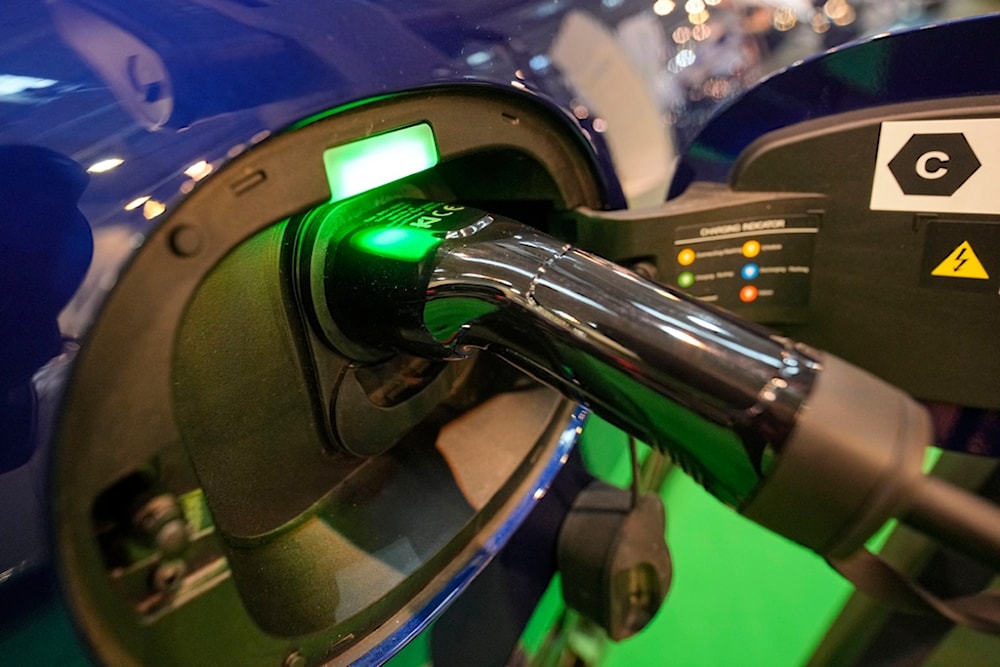Berlin's plan to end e-car subsidy sparks outrage, is China to blame?
A ministry spokesperson acknowledged the unfortunate situation for consumers but stated that the decision was unavoidable due to insufficient available funds.
-

An electric car of Chinese car maker BYD is charged at the Essen Motor Show in Essen, Germany, Friday, Dec. 1, 2023 (AP Photo/Martin Meissner)
The German government is facing harsh criticism for its sudden decision to terminate an electric car subsidy program, dealing a blow to an already struggling automotive industry.
The subsidy scheme, which offered thousands of euros to buyers of electric cars, has become a casualty of a budget crisis triggered by a surprise constitutional court ruling in November, disrupting the government's spending plans.
The economy ministry announced on Saturday that the subsidy application window would close on Sunday, leaving prospective buyers unable to benefit from the financial incentive.
A ministry spokesperson acknowledged the unfortunate situation for consumers but stated that the decision was unavoidable due to insufficient available funds.
Ferdinand Dudenhoeffer, an analyst from the Center for Automotive Research, warned of potentially severe consequences for the competitiveness of auto manufacturers. "The competitiveness of (auto) manufacturers will now be severely damaged," he told the Rheinische Post newspaper.
Read more: Work on $3.5bln Ford EV battery plant in Michigan put on hold
An Industry in Jeopardy
The Handelsblatt Business Daily expressed concern that discontinuing the subsidy program might jeopardize Germany's ambitious goal of having 15 million electric cars on the road by 2030. The goal, already considered challenging, now appears even more unrealistic in light of the subsidy cut, according to the publication.
Since 2016, approximately 10 billion euros ($1.1 billion) have been disbursed under the subsidy scheme, benefiting around 2.1 million electric vehicles, as reported by the Economy Ministry. Germany's flagship automotive industry has been grappling with the shift to electromobility amid a weak global economy and subdued demand. The industry also faces stiff competition from Chinese rivals, particularly in one of its crucial markets.
"The Chinese are massively expanding their car industry because they have customers. Our manufacturers no longer have any," Dudenhoeffer said.
The recent court ruling, which determined that the government violated a constitutional debt rule, further complicated matters by creating a substantial gap in spending plans. Chancellor Olaf Scholz's coalition was plunged into turmoil, and after weeks of negotiations, an agreement for the 2024 budget was finally reached on Wednesday, following an emergency budget for 2023.
Read more: German Airline demands $800,000 from climate activists as compensation
Is China a threat to the electric vehicle sector?
Writer Ding Heng who wrote for Al Mayadeen in September that China's successful electric vehicle industry, predicted to surpass Japan as the top global auto exporter, has prompted concerns about a renewed "China threat."
Western media, particularly during the Munich IAA auto show, highlights European automakers facing challenges from Chinese rivals.
While China claims over 70% of global battery cell production, fears of a zero-sum game emerge.
For instance, the strategic partnership between Volkswagen and XPeng demonstrates mutual benefits in technology exchange.
Moreover, China's cost advantage and investment in battery production have lowered battery costs for European EV manufacturers.
However, anti-China sentiment in the US poses challenges, with Ford's partnership facing scrutiny despite its potential benefits.
Read more: Chinese automaker to invest $10bn to make largest auto hub in Malaysia

 3 Min Read
3 Min Read








